First, let’s understand why black ants have invaded your home in the first place. Black ants are foraging creatures, leaving their nests in search of food. Once they find a food source, they bring it back to their colony and leave behind pheromone trails, which guide other ants to the food source.
To get rid of black ants, the first step is to cut off their access to food in your home. Next, erase any remaining pheromone trails and apply insecticide treatment. While there are many different types of insecticides available, ant baits are the most effective option.
Are all black ants the same? How much of a threat do black ants pose to your home? What about infestations in specific areas of your home or your car? In the following section, we’ll answer these questions and offer a comprehensive plan for addressing black ant infestations.
What Are Black Ants? | Black Ants in House
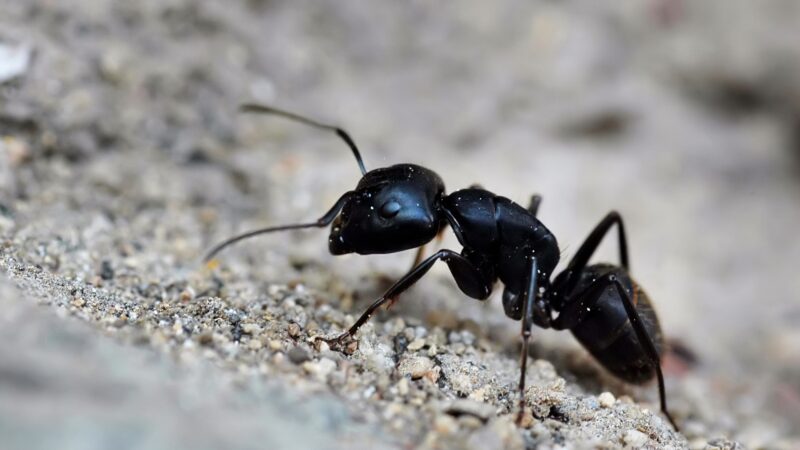
Black ants are a group of ants that can be found worldwide, with several species falling under this category. Some of the most commonly referred to black ants include:
- Carpenter Ants: These are larger than other black ants and can grow up to half an inch (12mm) long. Contrary to popular belief, carpenter ants don’t eat wood, but rather use it to construct their nests. An untreated carpenter ant infestation can lead to structural damage in your home.
- Acrobat Ants: These are prevalent in the eastern United States and can bend their abdomens over their heads when they feel threatened, giving them a scorpion-like appearance.
- Little Black Ants: These can be found throughout North America and are smaller than other black ant species, identifiable by their shiny shells.
- Common Black Ants: These are well-distributed globally and can be found in North America, Asia, Europe, and Australia. They’re also known as black garden ants.
On average, black ant workers have a lifespan of about 4 years, while black ant queens can live anywhere from 15 to 30 years, depending on the species.
Can Black Ants Damage My House?
Most black ant species won’t cause any damage to your home. However, carpenter ants are the exception, as an untreated carpenter ant infestation can lead to significant damage to the wooden structures in your home, particularly within your walls. If you suspect a carpenter’s ant infestation, it’s crucial to take action quickly to avoid costly repairs.
Related: How to Get Rid of Thatch Ants | Efficient, Safe, and Natural Solutions
Are All Big Black Ants Carpenter Ants?
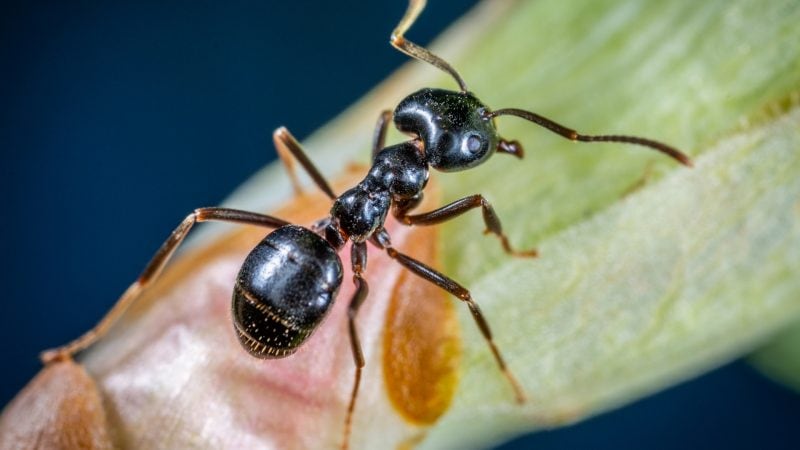
Not all big black ants are carpenter ants. Carpenter ants have a unique head shape that appears heart-shaped when viewed from above, with the tip of the “heart” leading to the mouth and two rounded bumps leading to the thorax. If this is not the case, you are likely looking at a common black ant, which is another species of larger-than-average ant.
What Are the Tiny Black Ants Called?
If you see tiny black ants in your home, you are likely dealing with a species commonly known as the little black ant, with a scientific name of Monomorium minimum. They can be identified by the two bumps (or nodes) on the thin space connecting the thorax and abdomen.
Black Ants With Wings
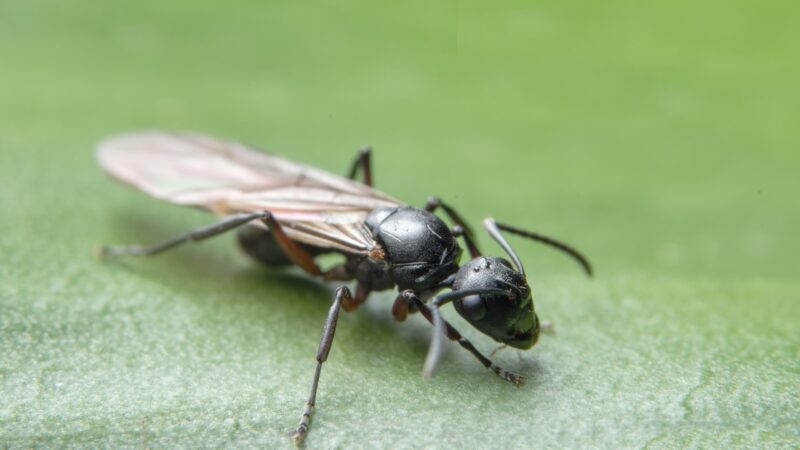
If you see black ants with wings, they are likely female carpenter ants. However, it is crucial to know the difference between winged ants and termites, as termites can be even more destructive to your home and require a different pest control method.
To distinguish between the two, take a close look at their wings. While both female carpenter ants and termites have two sets of wings on each side of their bodies, female carpenter ants have larger wings in the front and smaller wings in the back, while termites have four wings of equal size.
Black Ant Eggs
Black ant eggs are tiny, oblong, and white or off-white in color, laid inside the ants’ nests, typically located underground. However, carpenter ants are an exception, as they lay their eggs inside cracks in the wood.
Black Ant Bites: Do Black Ants Bite?
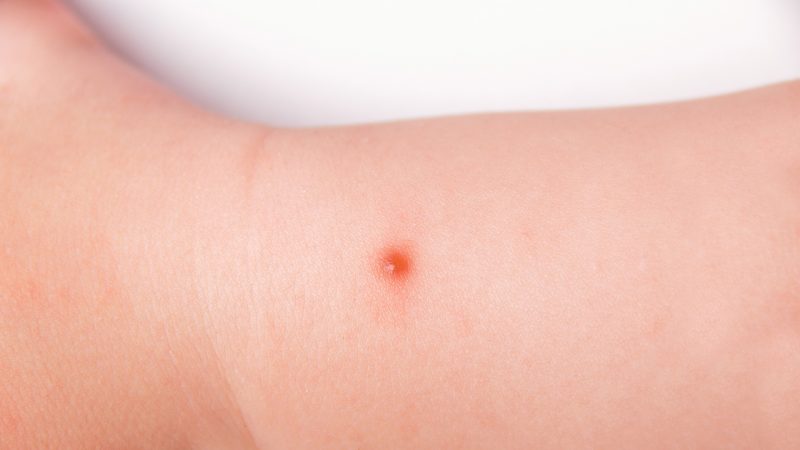
Some black ants will bite or sting if they feel threatened, making it important to discuss their bites.
What Do Black Ant Bites Look Like?
Black ant bites appear as round, red marks with a raised center and may appear as a single bite or a series of bites. It depends on the ant species’ aggressiveness and the length of time the ant remained on the body.
Black Ant Bite Symptoms
Black ant bites are typically painful and itchy and can lead to swelling and hives in the affected area. They can also cause more severe issues such as infection, and in rare cases, anaphylactic shock, which is a life-threatening condition.
Anaphylactic shock symptoms include shortness of breath, swelling of the throat or face, dizziness, stomach pain, vomiting, diarrhea, and even loss of consciousness. In the event of such symptoms, emergency medical help should be contacted immediately.
Do Black Ant Bites Itch?
Black ant bites can be very itchy, but it’s essential to avoid scratching the bite or the surrounding area as it can tear the skin and cause an infection due to harmful bacteria on your fingertips and fingernails.
Black Ant Bite Treatment
There are various ant bite and ant sting treatments available, many of which can be found at home. If bitten, wash the area thoroughly with soap and water, apply a cold compress to ease the pain, and use hydrocortisone cream to reduce the itching. To avoid or treat an allergic reaction to the bite, an oral antihistamine may also be helpful.
How to Get Rid of Black Ants? | Step-by-Step Instructions
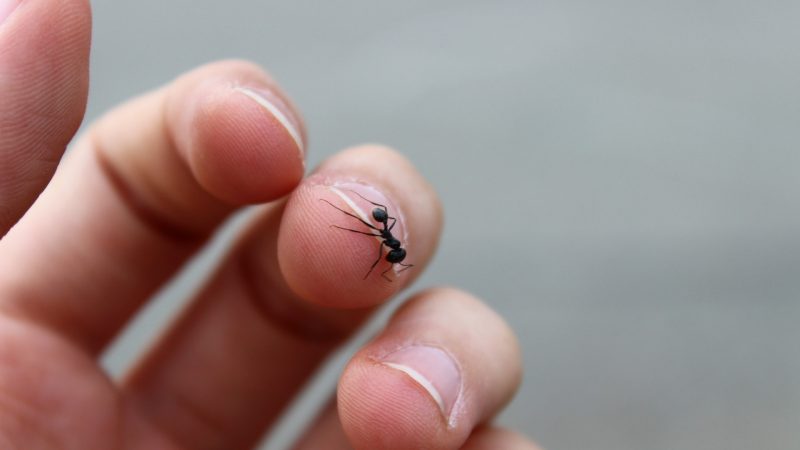
There are various methods to get rid of ants, but we will focus on what works and is available to everyone. Follow our detailed step-by-step guide to eliminating black ants quickly and effectively.
Step 1: Store Food Properly
While you can get rid of ants in your home today, they will come back tomorrow if you don’t store your food correctly. Check your pantry and dispose of any food you suspect ants have crawled on.
Store opened food in sealed glass or plastic containers, and keep them in the refrigerator if possible. Clean pet bowls after your pets eat to prevent food crumbs from attracting ants. Check the outside of containers for any food residue, and take your garbage outside to prevent food waste from attracting ants to your home.
Step 2: Wipe Down Hard Surfaces
Wipe down countertops, tables, sinks, shelves, and floors with a 50% water, 50% vinegar solution. This will erase any pheromone trails. However, do not use vinegar on natural stone or unfinished wood surfaces.
Step 3: Vacuum Your Home
Thoroughly vacuum your home, including upholstered furniture. Use a nozzle attachment to reach into the cracks of couches and chairs. This step is important to ensure that no crumbs are left behind, which can give ants a reason to return to your home.
Step 4: Set up Ant Bait
Set up ant bait in your home. Although you’ve eliminated the visible ants, more ants will likely scout your home in the coming days. Ant bait is an effective way to kill the entire ant colony, even if you don’t know where it is located.
Place ant bait around the likely entry points to your home, and the ants will carry the bait back to their nest and share it with the rest of the colony. This will eventually destroy the entire nest. You can purchase ant bait for indoor or outdoor use. See recommended products in the following section.
Related: What Attracts Ants? Information and Facts
Best Ant Killer Products
No products found.
Black Ant Infestations in the House
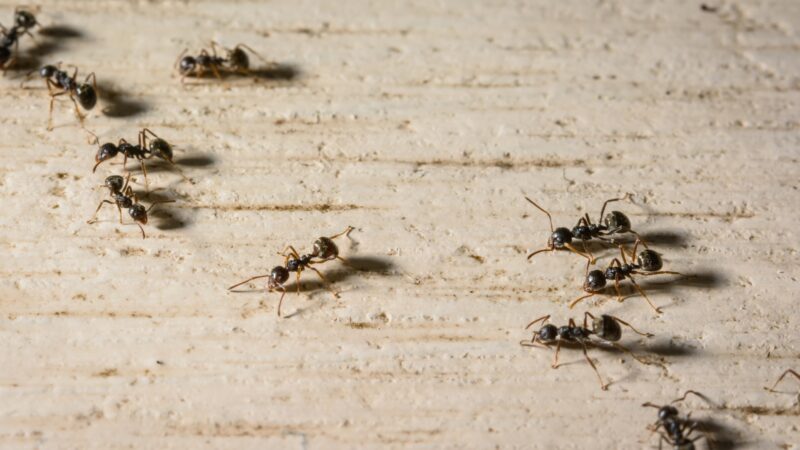
Kitchen
The kitchen is the most common place for black ant infestations. From food in pantries to crumbs on countertops, your kitchen is a hot spot for these pests. That’s why the key to getting rid of ants in your kitchen is to keep it absolutely clean.
In addition, place ant baits inside cabinets and drawers to ensure that any ants scouting for food will find the bait instead. Water is another reason why ants might be drawn to your kitchen. Ensure that you don’t leave spilled water in your kitchen, and ensure that any leaky pipes are repaired.
Bathroom
If you have black ants in your bathroom, you can be certain they’ve located a water source. Check around your bathtub and under your sink for any standing water. Keep these areas dry at all times, even if it means immediately wiping up the water droplets after you take a shower.
Remember that ants are small and even tiny sources of water can be enough to sustain them. If the problem persists, you can also place ant bait in your bathroom.
Bedroom
If you have ants in your bedroom, start by stripping your bed and washing your sheets and blankets at the warmest temperature that the fabric can handle. This will kill the ants and ensure that your bedding is clean.
Next, check your mattress and box spring. Vacuum up any ants with a nozzle attachment.
Then, vacuum the floors in your bedroom thoroughly. Any hard surfaces (except natural stone and unfinished wood) should be wiped down with half vinegar, and half water mixture. This will erase any pheromone trails that are leading ants to your bedroom. Ant bait may also be placed in the bedroom as well.
How to Get Rid of Black Ants in Car? | Instructions

Here are the instructions on how to get rid of black ants in your car:
Step 1: Move Your Car
If you find ants in your car, the first step is to move your car to a different location. This will prevent more ants from entering your car from the same source.
Step 2: Vacuum Your Car Thoroughly
Use a vacuum cleaner to thoroughly clean your car, paying close attention to the seats, carpets, and the spaces between the seats. This will remove any ants and any food crumbs that may have attracted them.
Step 3: Wipe Down Any Smooth Surfaces in Your Car’s Interior
Wipe down any smooth surfaces in your car, including the dashboard and doors, to remove any sugary drink spills or food residue.
Step 4: Wash the Outside of Your Car
Wash the outside of your car, including the undercarriage and wheel wells. This will remove any ant nests or colonies located outside your car.
Step 5: Pesticides
Consider using ant bait to get rid of any remaining ants. Place the ant bait in your car, which will lure the ants to the poison and eventually kill the entire colony.
Ant spray can also be effective in killing ants. However, be careful when using it in an enclosed area like your car. Keep the windows open while using it and leave them open for as long as possible afterward.
Foggers should be used only as a last resort, as they can be messy and time-consuming. If you use a fogger, be sure to air out your car for at least 6 hours and run the climate control for at least 15 minutes to clear the fumes from your car’s ventilation system.
By following these steps, you can eliminate black ants in your car and prevent them from returning.
No products found.
Related: Ants in Car: How to Get Rid of Ants in Car
Home Remedies for Black Ants | How to Get Rid of Black Ants Naturally?
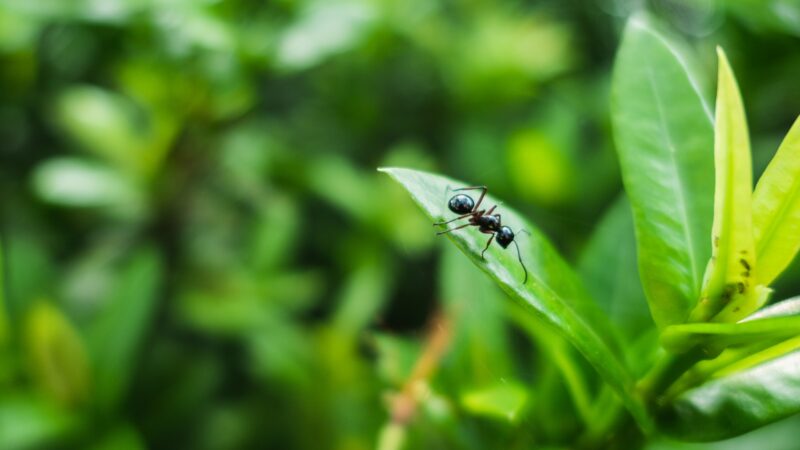
Looking for an eco-friendly way to get rid of black ants? Here are some home remedies that can help!
Diatomaceous Earth
Have you heard of diatomaceous earth? This all-natural substance is made up of tiny fossilized organisms found in the ocean, and it can be found at your local gardening or hardware store.
It’s an effective ant killer that dries out the pesky critters in no time. Sprinkle it along the entry points where you usually see ants in your house, but be sure to wear a mask when applying, as inhaling too much of it can irritate your lungs.
No products found.
Dish Soap and Water
Another simple solution is to mix one-part dish soap with three parts water. Pour the mixture into a spray bottle and aim it at the ants for a direct hit. The soap will stick to the ants and suffocate them, while also helping to keep surfaces clean and removing the pheromone trails. Easy, right?
Cinnamon
If you’re looking for a more fragrant approach, cinnamon is a natural ant repellent that can kill ants on contact. Simply sprinkle cinnamon around the areas where ants enter your home, or even directly onto the ants themselves. With its sweet and spicy scent, cinnamon not only keeps the ants at bay but also adds a touch of warmth to your home.
How to Prevent Black Ants From Invading Your House?
If you’re looking for ways to prevent black ants from invading your home, there are several effective measures you can take. By implementing these strategies, you can keep these pesky pests outside where they belong!
Caulking
First things first: sealing your home is crucial. Black ants can enter your home through even the tiniest of cracks, and poorly sealed doors and windows are the most common entry points. Check the areas around each door and window of your house, and re-caulk any areas that are cracked or missing.
Form a Barrier Around Your Home
Another effective approach is to form a barrier around your home using perimeter ant bait. This works similarly to regular ant bait but can be placed outside your home. Any ants scouting for food will stop at the perimeter of your home, believing they’ve found the perfect meal. They’ll carry the bait back to the nest, and within a short period of time, any ant colonies near your home will be wiped out.
Take Out the Trash Regularly
Of course, keeping your home clean is also key. Take out the trash regularly to remove any food waste that would otherwise attract black ants to your home. Be sure to wipe out the inside of your garbage can as well, removing any food residue that may be clinging to the sides. Additionally, clean dishes and countertops after cooking to ensure no crumbs or spills are left behind.
While these preventative measures can be effective, larger infestations may require professional extermination services. Acting fast is crucial, as ants and pests in general can spread rapidly.
In summary, black ant infestations are a common problem, but there are steps you can take to prevent and deal with them. By keeping your home clean and taking advantage of effective pest control products, you can control your black ant problem in no time. For more pest-related content, keep following our site!
List of Sources
Merchant M., Identifying Household Ants, Texas AgriLife Extension Service
Alsharani, M., Alanazi, M., & Alsalamah, M. (2009), Black ant stings caused by Pachycondyla sennaarensis: a significant health hazard, Annals of Saudi medicine
Monomorium minimum, Mississippi State University
Carpenter Ants: Insect & Disease Fact Sheets, Maine Department of Agriculture, Conservation and Forestry
Controlling Ants in the Home and Landscape, Institute of Food and Agricultural Sciences, University of Florida
- How to Get Rid of Copperheads | Practical Guide - August 27, 2023
- How to Get Rid of Corn Snakes | What Makes Them Aggressive? - August 27, 2023
- How to Get Rid of Alligators | Safety Measures and Removal Methods - July 16, 2023
